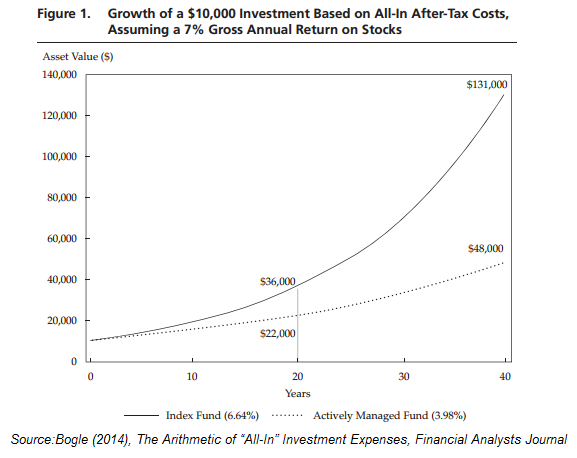Whatever You Do Avoid Mutual Funds
Post on: 1 Июнь, 2015 No Comment

This is your red-letter day, dear reader. If you hadn’t happened on this article, your life might have unraveled in a most unfortunate way. You might have — gasp! — invested in mutual funds!
As Shakespeare might say, Heaven forfend!
I’m here to steer you away from dastardly mutual funds and toward more sensible investments. Such as. well, I’ll think of some soon. In the meantime, let me list the countless drawbacks of mutual funds.
Diversification
If you invest in a mutual fund, you’ll instantly be invested in, say, 50 to several hundred stocks (or bonds, or what have you). Invest in a broad-market index fund — for example, one based on the S&P 500 — and you’ll own a stake in 500 of America’s biggest companies, Honeywell ( NYSE: HON ). Nabors Industries ( NYSE: NBR ). and Hershey ( NYSE: HSY ). Over many decades, the S&P 500 has averaged annual gains of about 10%.
That’s nice, but an average of just 10% per year? Sure, that’s more than the long-term average gains of bonds, real estate, and lots of other things. But come on, you gorbellied, knotty-pated hugger-mugger — that’s playing it too safe!
If you invest all your money in just one or two stocks and hold for the long run, you might do much better than 10%. Best Buy ( NYSE: BBY ). for example, sports an average annual return of more than 24% over the past 20 years. For Procter & Gamble ( NYSE: PG ). it’s above 15%, and for Tiffany ( NYSE: TIF ). that average return is 12%.
Of course, not every company fares as well. Radio Shack ( NYSE: RSH ) has averaged a little more than 2% over the same period.
Professional management
Some investors favor mutual funds because they allow trained professionals, some with sound ethics and deep insight, to invest your money for you. Well, I suppose that’s fine — if you’re a fobbing, clay-brained measle.
Don’t you have any respect for yourself? Do you really need someone else to manage your money? I suppose you don’t pull your own teeth, either, preferring to leave that to a professional. And how hard is it, really, to rewire a house? Electrician, shmelectrician.
OK, so mutual funds, at least the good ones, don’t cost too much. Investing advisors can take 2% or more of your assets each year — plus a share of your gains — in exchange for their professional guidance. In comparison, some index funds charge less than 0.25%, while many well-managed mutual funds charge around 1% or less.
If you wanted to buy into 20 companies on your own, it wouldn’t be cost-effective to do so without many thousands of dollars at your disposal. But with mutual funds, you can spread as little as $1,000 or less across a variety of companies.
Of course, you could put all your money in one stock. Sure, it’s risky, but it won’t cost you much, relatively speaking. If you plunk your entire $50,000 investment into one stock, the brokerage commission might be just $10 or $25 or $50. That’s peanuts. There’s your low cost, you yeasty, bat-fowling coxcomb, you.
Dollar-cost averaging
Oh, you just want to have your cake and eat it, too, don’t you, you puking, ill-breeding canker-blossom? You want to be able to add to your investments regularly over time, without incurring copious commission fees? You like that you can regularly invest in a few mutual funds painlessly and inexpensively?
Fine. Suit yourself, you droning, rude-growing pignut.
My simple plan of putting it all in one stock makes dollar-cost averaging easy. If you’re just plunking $25 at a time into stocks, and paying a $10 commission to do so, though, you’re not doing yourself too many favors.
More advantages
I know. You can cite other so-called advantages of mutual funds. They make record-keeping easier, for example. They’re very liquid, meaning you can cash out quickly if you need to (as opposed to, say, real estate).
There’s even a wide array of funds to choose from, including many that focus on companies by size, geographic region, industry, social responsibility, growth, or income. Go ahead and dwell on these if you want, you infectious, swag-bellied vassal.
And you, too, my fellow Foolish writers, you frothy, pox-marked gudgeons. I know that many of you look kindly on mutual funds. Rich Greifner, I know you think that funds are the Best. Investments. Ever . Tim Hanson and Brian Richards, I know you think you’ve found the market’s 10 best funds. There’s even a Fool writer who thinks you can double your money with funds !
That kind of pro-fund enthusiasm must be why we launched an investment service several years ago that’s dedicated to introducing investors to some top-notch mutual funds. I suppose there’s some sense to that, since many weedy, half-faced mammets will still opt for mutual funds, no matter how much common sense I try to beat into them. (And, OK, I concede that the newsletter is doing rather well, with its picks beating the market by double digits.)
So go ahead, you beslubbering, flap-mouthed harpies. I invite you to sign up for a free trial of our Motley Fool Champion Funds newsletter, which offers regular fund recommendations monthly in an easy-to-digest format. A free trial gives you access to all past issues, so you can read about each recommendation in detail. you goatish, earth-vexing nut-hook.
This article was first published July 16, 2007. It has been updated.
Longtime Fool contributor Selena Maranjian owns shares of no company mentioned in this article. She tapped the services of a Shakespearean insult generator for this article. Best Buy is both an Inside Value recommendation and Stock Advisor selection, as well as a Motley Fool holding.The Motley Fool is Fools writing for Fools .














